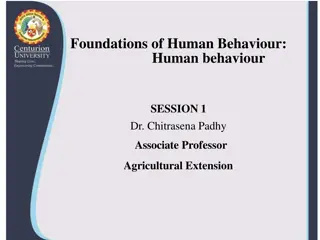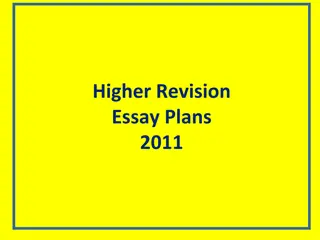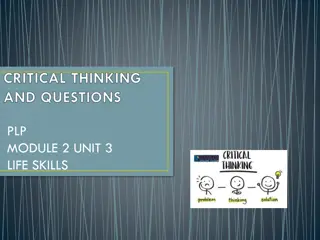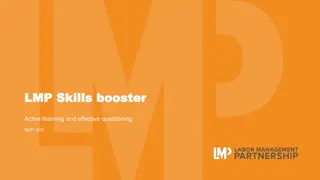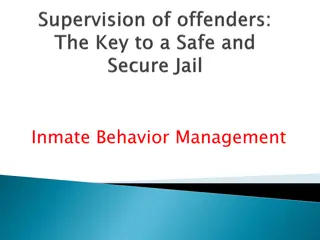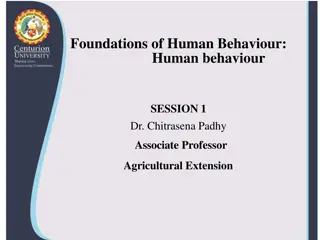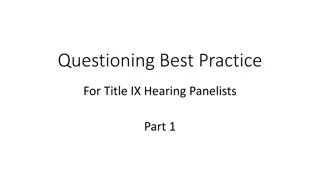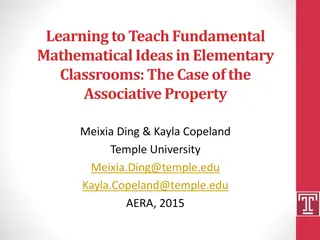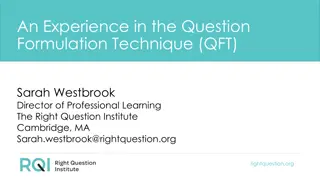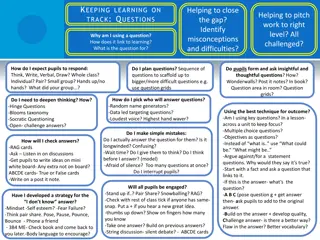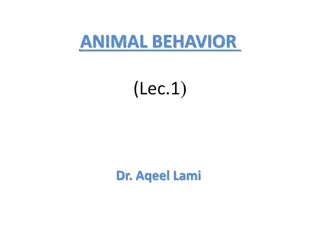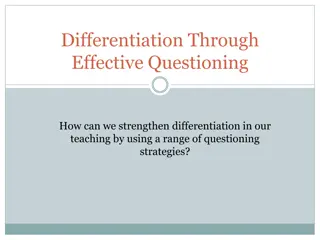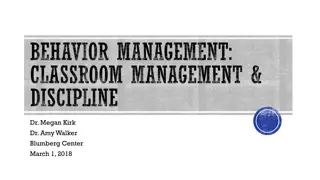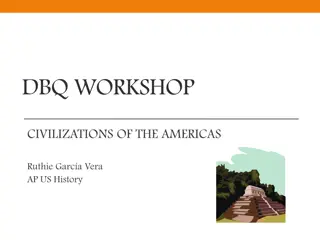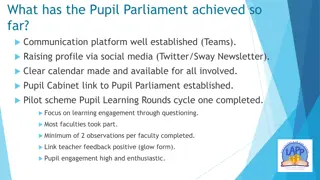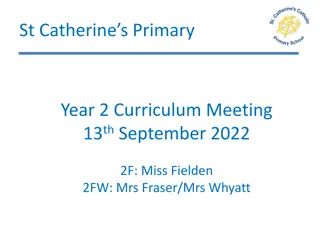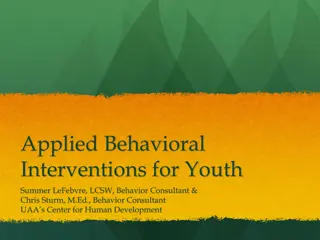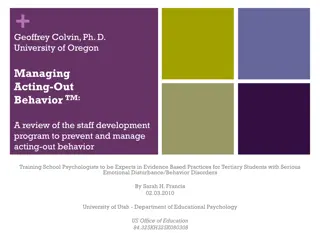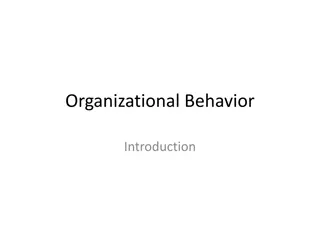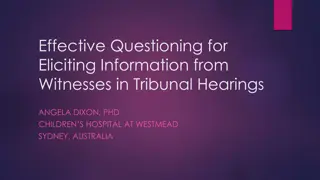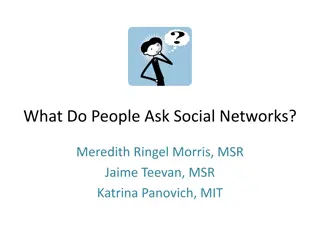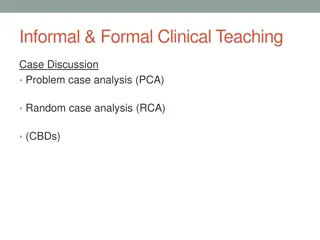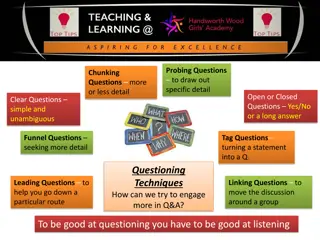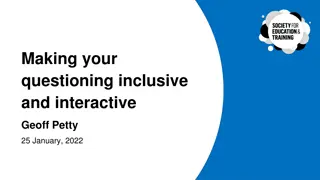Positive Behavior Support Interventions in Education
Learn about Tier 1 Positive Behavior Interventions & Supports (PBIS) developed by California State University and LA Unified School District. Explore evidence-based strategies like effective transitions, praise, choice-making, and establishing routines to promote positive behavior in students. Disco
1 views • 10 slides
Function Based Thinking
Function-based thinking in Missouri Schoolwide Positive Behavior Support, emphasizing data-based decision-making, mission clarity, and effective teaching practices. Understand how behavior is related to the environment and how environmental interventions play a key role in shaping expected behaviors
6 views • 27 slides
Addressing Predatory Behavior in the Fellowship
Predatory behavior, especially towards vulnerable members, is a concerning issue in the fellowship. This behavior includes unwelcome advances, exploitation of power dynamics, and institutional sexism. The discussion on predatory behavior necessitates honest dialogue and a united approach for a safer
3 views • 13 slides
Understanding Human Behavior: Foundations and Complexity
Human behavior encompasses the actions and interactions of individuals influenced by factors like genetics, culture, and situational contexts. It involves observable overt behaviors as well as hidden covert behaviors, with a dynamic interplay between individuals and their environments. Psychologists
8 views • 20 slides
GD Bart Puppy Test: Behavior Scoring System Overview
The GD Bart Puppy Test is a standardized behavioral scoring system designed for puppies at 8 weeks of age, focusing on 21 test components to predict success in canine behavior. Conducted by a team of 3 people, the test evaluates stress signals and responsiveness levels to various stimuli. Multiple e
6 views • 15 slides
Understanding the Role of Board-Certified Behavior Analysts in Supporting Students with Autism in PA School Programs
Pennsylvania Training and Technical Assistance Network (PaTTAN) plays a crucial role in supporting students with autism through the efforts of Board-Certified Behavior Analysts. The increasing number of students eligible for IEPs under the definition of autism necessitates skilled educators who can
0 views • 20 slides
Influencing Factors on Voting Behavior: A Comprehensive Analysis
In the realm of voting behavior, factors such as media, social class, age, gender, and more play critical roles. This essay delves into the complexity of factors influencing voting behavior, assessing their relative importance and the balance of their impact. The discussion includes models of voting
0 views • 12 slides
Enhancing Critical Thinking Skills Through KWHL Chart
Critical thinking entails questioning and seeking more information before accepting ideas. The KWHL chart method is introduced to improve critical thinking skills, encouraging students to note what they know, what they want to learn, how they can learn more, and what they have learned. Engaging in a
0 views • 5 slides
Enhancing Communication Skills Through Active Listening and Effective Questioning
Explore the importance of active listening and effective questioning in communication. Learn strategies to show you're listening, even virtually. Discover the benefits of an active listening mindset and how to overcome barriers to listening effectively in various environments.
4 views • 33 slides
Understanding Consumer Behavior in Marketing
The design of a marketing program starts with understanding consumer behavior. Consumers, as the end users, play a crucial role in shaping market trends. Producers seek insights into consumer personas, market behaviors, and influencing factors. Management focuses on the consequences of consumer beha
2 views • 26 slides
Understanding Psychology: The Science of Behavior and Mental Processes
Psychology is the scientific study of behavior and mental processes. Psychologists study both observable behavior and private mental processes. The primary goals of psychology are to describe, understand, predict, and control behavior. Different branches of psychology, such as applied psychology, cl
2 views • 29 slides
Understanding Inmate Behavior Management in Correctional Settings
Inmate Behavior Management in correctional facilities involves supervising inmates, implementing corrective discipline, and fostering a fair and consistent environment. It emphasizes the importance of behavior management plans, identifying undesirable traits in supervision, and passing educational a
0 views • 19 slides
Understanding Human Behavior: Foundations and Factors
Human behavior is a multifaceted subject influenced by genetic makeup, culture, and individual values. It encompasses both overt actions and covert thoughts, a product of the individual and environmental factors. Psychologists study behavior from visible (overt) actions like playing football to inne
0 views • 20 slides
Understanding Normal and Abnormal Behavior: Perspectives and Definitions
Normal behavior varies from person to person and society, influenced by individual preferences and societal norms. Abnormal behavior is characterized by an inability to function effectively or personal discomfort. The concept of normality and abnormality in psychology raises complex questions about
2 views • 8 slides
Strategies for Effective Questioning in Title IX Hearings: Part 1
Learn evidence-based questioning strategies to engage parties and witnesses effectively in Title IX hearings. This includes creating a questioning plan, practicing empathy, cultivating rapport and cooperation, active listening, addressing discrepancies, and avoiding unproductive techniques. Utilize
0 views • 15 slides
Unpacking the Associative Property of Multiplication in Elementary Classrooms
This study delves into how prospective teachers transform learned specialized content knowledge from professional development to elementary classrooms, focusing on the associative property of multiplication. The research explores the process of unpacking worked examples through representation uses a
1 views • 19 slides
Enhancing Learning Through Question Formulation Technique (QFT)
Sarah Westbrook, Director of Professional Learning at The Right Question Institute, explores the importance of teaching question formulation skills. The session covers the benefits of QFT in collaborative learning, real classroom examples, and why questioning is crucial now. Learn how to access free
0 views • 84 slides
Strategies for Effective Questioning and Student Engagement in Learning
This detailed guide explores various questioning techniques and strategies to enhance student engagement, identify misconceptions, and close learning gaps. It covers methods to scaffold questions, encourage insightful inquiries, utilize response systems, and develop critical thinking skills. The con
0 views • 12 slides
Understanding Human Behavior: Insights for Social Workers
This material delves into the intricacies of human behavior, exploring factors influencing behavior such as heredity, environment, intelligence, needs, and motives. It covers the concept of human behavior, stages in life from conception to old age, and theories of human development by eminent psycho
2 views • 71 slides
Understanding Animal Behavior and Ecology
Animal behavior encompasses a range of activities such as feeding, breeding, and social interactions. Ethology focuses on studying behavior in natural environments, while behavioral ecology examines ecological aspects like predator-prey interactions. Sociobiology delves into the evolution of social
3 views • 5 slides
Strengthening Differentiation Through Effective Questioning Strategies
Strengthening differentiation in teaching through a range of questioning strategies is crucial for promoting deeper thinking and engagement among students. By encouraging more questions and focusing on the process of inquiry, educators can ignite curiosity, creativity, and critical thinking skills.
0 views • 23 slides
Effective Questioning Techniques in Teaching
Techniques involved in effective questioning in teaching include asking questions to the whole class, proportionate distribution of questions, providing wait time for students to answer, sequencing questions from simple to complex, and avoiding excessive questioning. It is important for teachers to
1 views • 11 slides
Understanding Behavior Management in Classroom Settings
Explore the essential topics of behavior management, classroom strategies, and discipline in educational settings. Delve into the functions of behavior, impact of trauma on learning, and effective management techniques. Learn how to identify underlying reasons for student behaviors, discuss behavior
0 views • 76 slides
History Essay Writing Tips and Questioning Levels
Learn the levels of questioning for essay writing: Recall, Analysis, and Synthesis. Discover essential tips for writing history essays, including thesis statements, using evidence, and avoiding common mistakes. Understand different question modes and how to structure your arguments effectively.
0 views • 35 slides
Targeting Emotions to Facilitate Behavior Change in Older Adults
Efforts in changing health behavior have traditionally focused on social and cognitive factors, but recent evidence highlights the importance of affective states in decision-making and behavior change. Janey Peterson discusses the role of emotions in achieving and sustaining behavior change to benef
0 views • 11 slides
Grading Criteria for Effort and Behavior in Educational Reporting
Effort and behavior in educational settings are evaluated based on criteria ranging from Excellent to Causing Concern. Pupils demonstrating excellent behavior show respect, responsibility, and positive engagement in learning. Those with good behavior exhibit cooperation and respect for others, albei
0 views • 9 slides
Achievements and Next Steps of Pupil Parliament
Pupil Parliament has made significant progress in establishing communication channels, utilizing social media, implementing learning rounds, and enhancing student engagement through questioning. Moving forward, their focus is on enhancing wider skills, fostering a culture of questioning, and incorpo
0 views • 4 slides
Enhancing Learning Through Better Questioning Techniques
Empower educators to boost student learning by teaching effective questioning skills at the NCSS 2017 National Conference. Learn about the Question Formulation Technique (QFT), explore classroom applications, delve into new learning models, and engage in collaborative activities for enhanced student
0 views • 87 slides
St. Catherine's Primary Year 2 Curriculum Meeting Overview
Overview of the recent curriculum meeting at St. Catherine's Primary for Year 2 parents. The meeting covered attendance, literacy, RE, uniform, assessments, behavior, home-learning, safeguarding, e-safety, and more. Details on drop-off and pick-up arrangements, what to do if your child is unwell, un
0 views • 24 slides
Mastering the Deposition Process for Legal Professionals
Discover the ins and outs of taking or defending depositions with expert advice on preparation, questioning techniques, and maximizing the deposition experience. Learn why depositions are crucial in building a strong legal case, uncovering new information, and testing theories. Gain insights into us
0 views • 15 slides
Understanding Applied Behavior Analysis (ABA) for Youth Interventions
Applied Behavior Analysis (ABA) is a science focusing on improving human behavior by increasing desired behaviors, teaching new skills, and generalizing behaviors. ABA emphasizes observable behaviors, measurement of behavior change, and the use of interventions in various settings like classrooms an
0 views • 25 slides
PBIS Expectations and Behavior Flowchart
The PBIS flowchart outlines behavior expectations and interventions for minor and major incidents in a school setting. It covers disrespectful behavior, disruption, defiance, property damage, theft, possession of weapons, and more. The flowchart guides teachers and staff on managing and addressing s
0 views • 6 slides
Managing Acting-Out Behavior: A Staff Development Program Review
This review discusses a staff development program created by Geoffrey Colvin, Ph.D., from the University of Oregon, focusing on preventing and managing acting-out behavior in students with emotional disturbance or behavior disorders. The program includes video presentations, strategies for behavior
0 views • 22 slides
Understanding Organizational Behavior and Individual Behavior
Organizational Behavior (OB) is a multidisciplinary field that combines knowledge from various disciplines to study and manage organizations effectively. It emphasizes the application of this knowledge to enhance organizational effectiveness and the well-being of participants. OB is a useful concept
0 views • 38 slides
Function-Based Behavior Support Plans: A Comprehensive Guide
Explore the process of developing Function-Based Behavior Support Plans (BSP) using Functional Behavioral Assessment (FBA). Understand the concepts of function and functional behavior assessment, learn how FBA/BSP fits within a multi-tiered support system, and practice developing BSP for students. D
0 views • 74 slides
Effective Questioning Techniques in Tribunal Hearings
Effective questioning techniques are crucial in tribunal hearings to elicit accurate information from witnesses. Angela Dixon, Ph.D., emphasizes the importance of asking the right questions to engage participants and achieve optimal outcomes. Communication barriers, competency areas, and strategies
0 views • 32 slides
Understanding People's Questions on Social Networks
This research explores various aspects of questioning behavior on social networks, including the types of questions asked, how they are phrased, who asks them, which questions receive answers, and motivations for answering. It also delves into known information about collaborative search, online que
0 views • 19 slides
Effective Clinical Teaching Strategies and Questioning Techniques
This content discusses informal and formal clinical teaching methods, case discussion, problem case analysis, constructivism, learning from experience, and the importance of questioning in clinical settings. It emphasizes learning through experience and transforming knowledge, with a focus on creati
0 views • 9 slides
Effective Questioning Techniques for Engaging Discussions
Explore the art of effective questioning techniques to enhance discussions through probing, chunking, clear and ambiguous questions, funnels, leading questions, and more. Learn how to foster engagement through active listening and structured questioning approaches for dynamic communication.
0 views • 5 slides
Enhancing Questioning Techniques for Interactive Learning
Geoff Petty discusses strategies for making questioning inclusive and interactive in the learning cycle. The content also explores Bloom's Taxonomy levels, including high cognitive demand elements and a fun problem-based learning scenario with the Jabberwocky poem.
0 views • 55 slides



